Fiona Dunlop
It’s hardly scenic nor is it ritzy, but dig a little deeper behind the facades of this bustling shopping street and you’ll find a microcosm of multicultural London.
Intrigued by the plethora of ethnically diverse shops and restaurants, I embarked on a walk of discovery at the top of Blackstock Road where it cuts south to the leafier, more middle-class uplands of Highbury. But this section is mainly working-class London, encapsulated by a mosaic of nationalities who emerge from the transport hub of Finsbury Park to shop or work at the multifarious businesses.
Part of this multi-ethnicity is due to a nearby mosque, a gold-domed magnet for Muslims, and part due to low shop rents in what has long been a gritty neighbourhood. Key, too, is the proximity of Emirates Stadium, the home stadium of Arsenal Football Club – bringing armies of football fans in search of tasty, affordable food. But the area is changing, with other nationalities and religions moving in, including young, hip Brits who show how this global capital embraces immigrants. More than a third of Londoners are now foreign-born, representing 270 nationalities.
Family businesses dominate the 1km stretch in north London, permitting only one small chain supermarket to squeeze in. My first stop was Al Bahia, an Algerian butcher and grocery shop run by three brothers: Hakim, Kemal and Fetah Amokrane. Hakim, full of confidence, gave me the background: “We opened in 2006 as a halal butcher, but I’ve been in London for the last 30 years since the Algerian civil war.”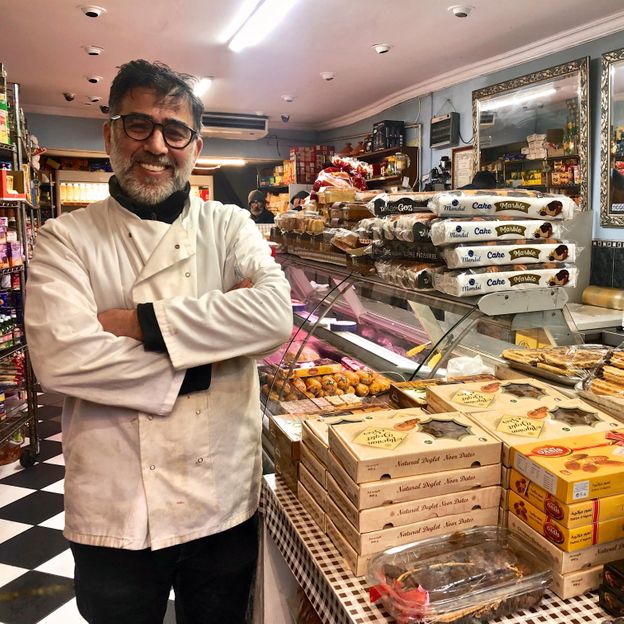
Hakim Amokrane and his two brothers run Algerian butcher Al Bahia (Credit: Fiona Dunlop)
In that time, he has acquired a marked London accent sprinkled with colloquialisms, and clearly loves interacting with customers. “Not all are Muslim,” he told me, though the Arabic greeting salaam alaikum constantly reverberated. “We want to serve everybody. After all these years, we feel part of the community. Here I found a culture that fulfilled me, a different way of life and language. My schooling in Algiers was in French, so I express myself better in French than in Arabic, but I wanted an alternative. I studied international business law at university, then followed family tradition by opening this shop.”
We want to serve everybody. After all these years, we feel part of the community. Here I found a culture that fulfilled me, a different way of life and language
Bulging bags of Moroccan couscous vied with North African olive oils and dates, baklava, Spanish dried figs, French cheeses and a refrigerated counter of spicy merguez sausages, but the trump card was at the door: pungent, spiced rotisserie chickens.
Across the street I passed the well-established Ethiopian café and deli, St Gabriel, to enter the enigmatically named MK. This father-and-son emporium is the oldest on the street, opened in 1976 when this was a red-light district. The owner, Mohammed Aslam, a slight, cheerful man, is assisted by his son, Khayam, a Londoner. Ugandan-born Aslam returned to his Pakistani origins as a child, later entering banking in Lahore. “I like adding up!” he laughed.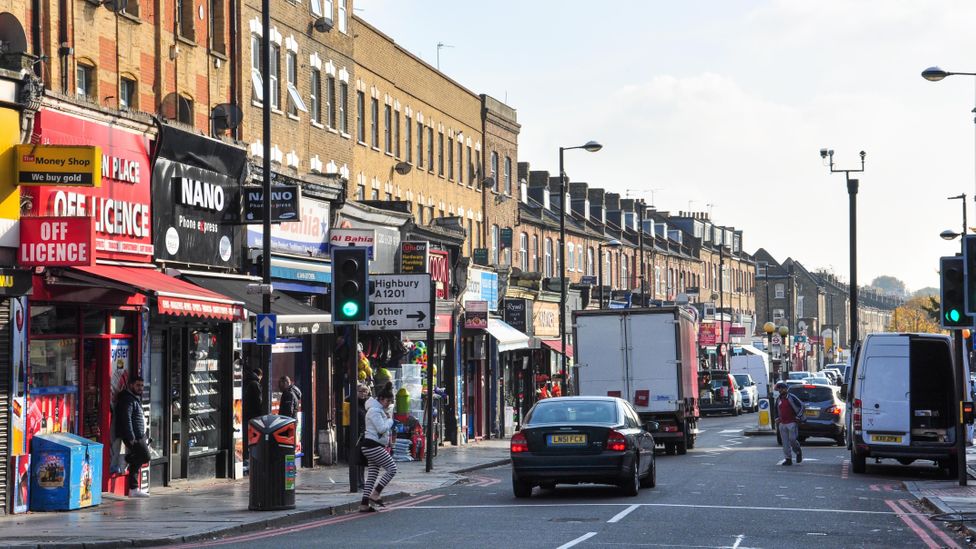
Blackstock Road is a bustling, diverse street in north London (Credit: Peter Moulton/Alamy)
Hyper-energetic, he hardly stopped working as we chatted. “When I opened, customers were mainly Caribbean and English, then came West Africans, Bangladeshis, Somalians and Algerians,” he said. “Now we have Ethiopians, Colombians and quite a lot of English. We must never depend on just one community in business.”
As I browsed through karkadé (hibiscus tea), okra, yams, mangoes, guava, medjoul dates, a dizzying array of spices, rices, Spanish beans and fiery Scotch bonnet chillies, I was lulled by a recording of melodious chanting of the Quran. “It brings peace of mind,” said Aslam.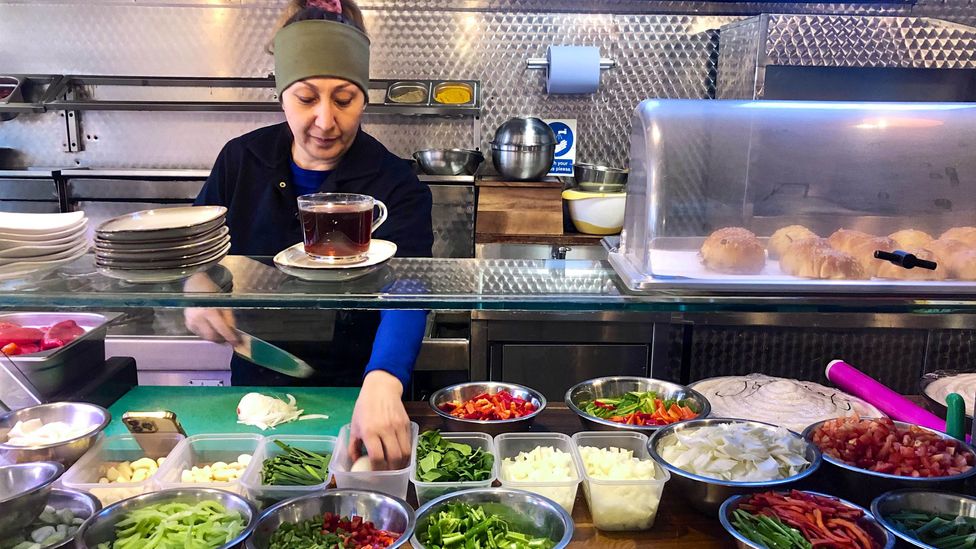
Dilara owners Abdul and Rose Axmu came to London after escaping persecution in Xinjiang (Credit: Fiona Dunlop)
Opposite, I stopped off at Dilara, a Uyghur restaurant and takeaway run by husband-and-wife team, Abdul and Rose Axmu. Escaping persecution in Xinjiang, an autonomous territory in north-west China, they came to the UK and opened this business seven years ago.
Uyghur food is a tantalising melting-pot of Central Asian cultures; here you’ll find hand-pulled flat noodles, meat samosas, dumplings, aubergine stew, pilaf rice, chilli chicken and spiced lamb kebabs – “the best!” asserted Rose. “It’s exhausting work to prepare all these dishes. But we like our customers who even come from far outside London.”
After a succession of Algerian and English cafes came Mix, a popular Chinese hardware shop that stocks just about every household item imaginable – many painted on the shutters. Mrs Sau Li opened this Aladdin’s cave in 1979 after coming from Hong Kong, and two of her children now run the shop whenever she’s away.
Although coy about giving their names or being photographed, their knowledge of the stock was as encyclopaedic as their mother’s. Flower pots, wire, screws (sold individually), tools, paintbrushes, wood, brooms, crockery, mouse traps (“a best-seller”) – it was all there.
In this jumble where every inch of space, including the ceiling, was crammed, I asked Li’s daughter how she remembers where things are. “Memory!” she giggled. “If I saw it there before, it must still be there.”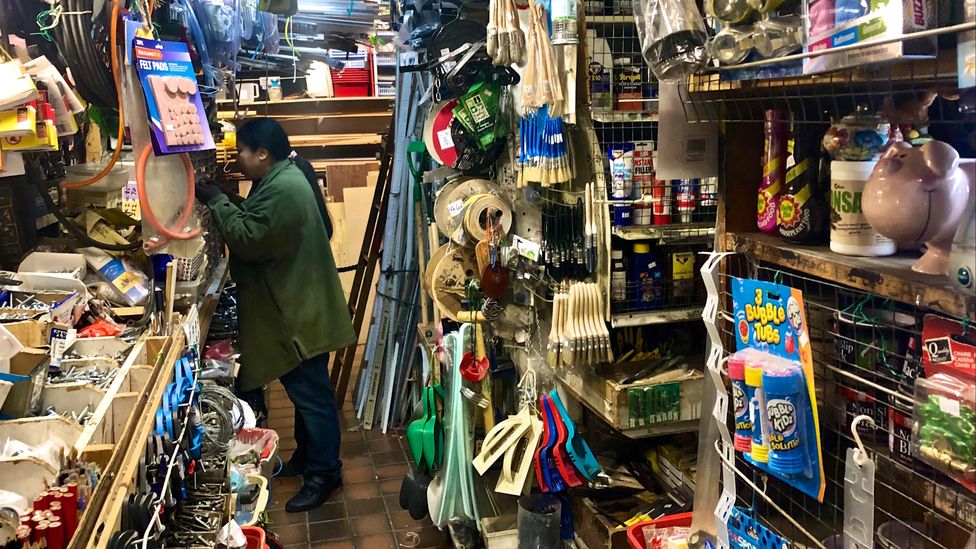
Mix is a popular Chinese hardware shop that stocks just about every household item imaginable (Credit: Fiona Dunlop)
Opposite, La Princesse, an Algerian cake-shop, displayed extravagantly creamy cakes, next to Special Eyes, a Palestinian optician. But I was lured by a tiny takeaway shop, Baban’s Naan where customers chatted in a huddle at the door. This nondescript place opened five years ago, an extension of Malik Tahidi’s family business in Iranian Kurdistan. The warm naan bread expertly flipped on a hot plate by his assistant, Adel (an Iraqi Kurd), can be topped with sesame, za’atar, chilli, garlic or cheese, accompanied by falafel, kibbeh and kebab.
Onwards, I passed 20-year-old Il Cavaliere, an idiosyncratic Italian restaurant whose one-man-band owner, Antonio, gears his venue towards match days – making opening hours erratic. It’s the opposite case at Yildiz, a well-liked Turkish restaurant where up to 10 employees work in the cavernous interior daily. Here I talked to Uygar Guzel, the youthful son of owner Erdogan who, despite 20 years in London, still has limited English. “Maybe 10% of our customers are Turkish, the rest reflect this mixed neighbourhood,” he said, referring to the mutating demographic as side streets become increasingly gentrified.
This ocakbaşi (charcoal grill), famed for its lamb and chicken kebabs grilled over smoking coals, also offers plentiful hot and cold meze, vegetable dishes and fresh fish. “We buy the meat at Smithfields market – mainly Welsh or Scottish lamb – and our pide (pita bread) is freshly made every morning,” said Guzel. No one leaves hungry at Yildiz.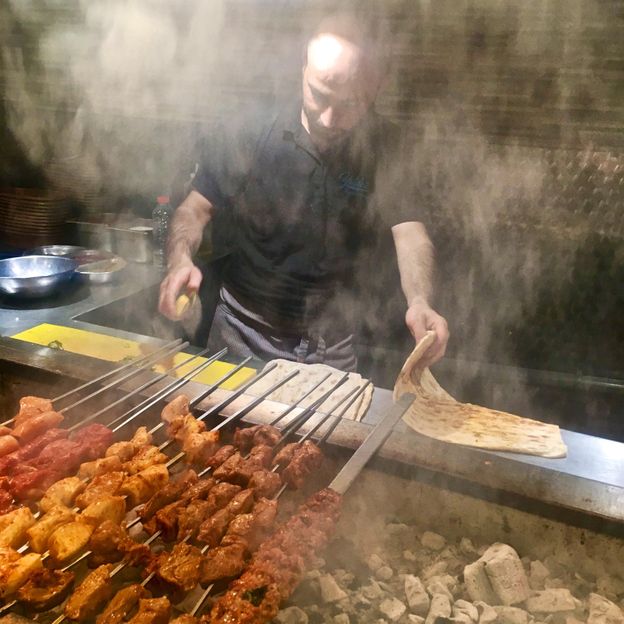
Yildiz is famed for its lamb and chicken kebabs grilled over smoking coals (Credit: Fiona Dunlop)
The meaty aromas wafted across the street to Sultan Carpets, a business built up by three Eritrean brothers who fled their country during the 1990s war with Ethiopia. In contrast, I was surprised to discover an injection of feminine Thai culture at Anta Salon & Spa, a beauty salon owned by outgoing Minky, backed by three assistants.
London is a very open-minded city, but I love north London and Blackstock Road in particular
Between these representatives of Africa and Asia, Europe showed up in style at Margaux, a chic hairdresser’s owned by Margaux Cras, a dynamic young Frenchwoman from Lille. “I came to London by chance eight years ago, opened this salon and never looked back,” she told me. “London is a very open-minded city, but I love north London and Blackstock Road in particular. I feel at home in the mix – everyone is respectful of other communities, I feel safe.”
Her seven stylists come from all over the world, Iran included, and her ambitious business is thriving. She is so happy with this location that she now lives above the salon. “Thirty percent of my clientele are French – the others are British and European,” she said. “It’s like a village where people enjoy their local shops.”
Back to food, I entered Jojo’s Kitchen, an Ethiopian restaurant opened in 2022 by Yohannes Asfha, tall, mild mannered and nicknamed Jojo. Full of Ethiopian decor, it seats more than 50 people, yet is managed entirely by Jojo (the cook) with his Eritrean partner and her brother serving.
“I came to the UK as an asylum seeker in 2008, then learned English,” he told me. After working in restaurants in Addis Ababa and then London, Jojo’s next step was to open his own place. “I chose this area for the diversity and type of nearby clientele,” he said.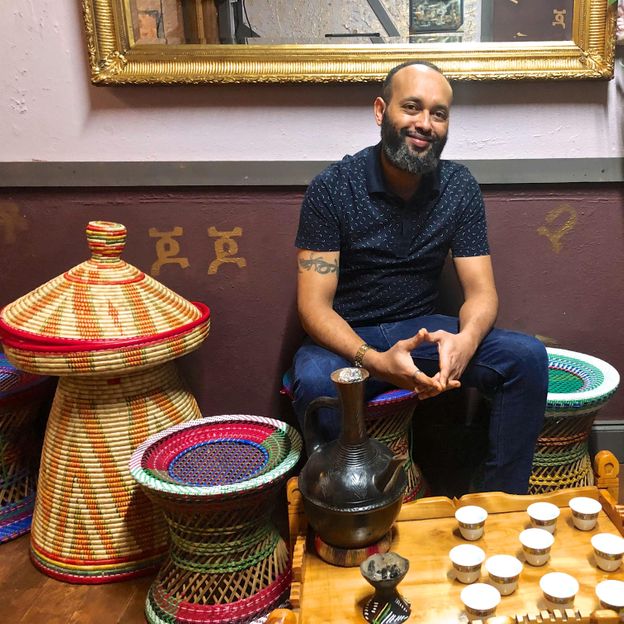
Ethiopian restaurant Jojo’s Kitchen imports many of its ingredients from Addis Ababa (Credit: Fiona Dunlop)
His gluten-free teff (an Ethiopian grain) comes from Addis three times a week, as do herbs, pepper and coffee. “Sometimes we hold a traditional coffee ceremony for customers, roasting the beans in front of them – they love the fragrance.”
Beyond Sari Cicek, a friendly Turkish corner shop that, amazingly, is open 365 days a year until 01:00, I continued through European territory at Little Sardegna, a Sardinian restaurant followed by a classic Italian, Il Guscio, further uphill.
Just before, however, came a shining example of English entrepreneurship: Bookbar, a bookshop, cafe and wine bar that has gone from strength to strength since its ebullient owner, Chrissy Ryan, sold books through the door during lockdown. Young women in particular flock here for a drink, a read or to attend one of Ryan’s literary events.
I love working in the area as there’s so much support between businesses – we all know each other
“It’s becoming a destination round here,” she told me. “Young professionals, families and a mix of generations and nationalities bring lots of footfall. And I love working in the area as there’s so much support between businesses – we all know each other.”
In just one shop Chrissy has created a flourishing community – and a bridge between others.
Soon I reached Highbury. The pavements were emptier, the atmosphere had changed and the name of the road too, leaving me nostalgic for the buzz, characters, aromas and tongues of Blackstock Road.
Courtesy: bbc







